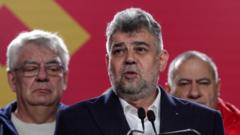Friedrich Merz officially takes office as Chancellor, pledging to tackle voter discontent and strengthen Germany's position on the global stage.
New Era for Germany as Friedrich Merz Takes Chancellor Role

New Era for Germany as Friedrich Merz Takes Chancellor Role
Germany's Stalemate Ends with Merz's Promises for Economic Revitalization
Germany's political landscape is shifting as Friedrich Merz is set to be sworn in as Chancellor, concluding a lengthy period of stalemate following the collapse of the previous government. At 69 years old, Merz aims to invigorate the national economy and enhance Germany's stature internationally. Upon signing a coalition deal with the Social Democrats, he emphasized the need for the government to succeed, presenting it as a historical responsibility.
Supporters within the Christian Democratic Union (CDU) believe that effective governance could alleviate the growing dissatisfaction among voters. Mark Helfrich, a CDU Bundestag member, states, "We need to demonstrate our ability to solve problems in a responsible manner." The coalition, comprising the CDU, CSU, and SPD, holds a slim majority of 328 seats—only slightly above the threshold needed for governance.
In the wake of the recent federal election, which saw the CDU/CSU gain a modest four-point increase in support while the SPD suffered its worst electoral result since World War II, Merz's administration faces considerable challenges. His agenda includes tightening immigration policies, substantial investment in infrastructure, and restoring connections with vital European partners. He has already pushed through a law allowing for exemptions in defense and security spending, though convincing the public of the necessity for increased defense funding remains critical.
The far-right Alternative für Deutschland (AfD) party now serves as the main opposition, advocating for extreme policies such as closing borders and halting arms supplies to Ukraine. Recently classified as an extremist organization by domestic intelligence, the AfD is contesting this designation in court and has garnered support from certain factions within the U.S., including figures from Donald Trump's former administration.
Navigating these dynamics will require skill, particularly as Merz has unfolded aspirations to strengthen ties with both the U.S. and European allies. His diplomatic overtures are expected to begin with visits to Paris and Warsaw, aiming to mend relationships that he claims weakened under former Chancellor Olaf Scholz. Polish politician Agnieszka Pomaska voices the sentiment for enhanced cooperation, underscoring the importance of a strong German leadership role in the European Union.
With challenges mounting and the far-right pressing from the sidelines, the success of Merz’s government will rely heavily on its ability to address both national concerns and international relationships in a rapidly changing political climate.
Supporters within the Christian Democratic Union (CDU) believe that effective governance could alleviate the growing dissatisfaction among voters. Mark Helfrich, a CDU Bundestag member, states, "We need to demonstrate our ability to solve problems in a responsible manner." The coalition, comprising the CDU, CSU, and SPD, holds a slim majority of 328 seats—only slightly above the threshold needed for governance.
In the wake of the recent federal election, which saw the CDU/CSU gain a modest four-point increase in support while the SPD suffered its worst electoral result since World War II, Merz's administration faces considerable challenges. His agenda includes tightening immigration policies, substantial investment in infrastructure, and restoring connections with vital European partners. He has already pushed through a law allowing for exemptions in defense and security spending, though convincing the public of the necessity for increased defense funding remains critical.
The far-right Alternative für Deutschland (AfD) party now serves as the main opposition, advocating for extreme policies such as closing borders and halting arms supplies to Ukraine. Recently classified as an extremist organization by domestic intelligence, the AfD is contesting this designation in court and has garnered support from certain factions within the U.S., including figures from Donald Trump's former administration.
Navigating these dynamics will require skill, particularly as Merz has unfolded aspirations to strengthen ties with both the U.S. and European allies. His diplomatic overtures are expected to begin with visits to Paris and Warsaw, aiming to mend relationships that he claims weakened under former Chancellor Olaf Scholz. Polish politician Agnieszka Pomaska voices the sentiment for enhanced cooperation, underscoring the importance of a strong German leadership role in the European Union.
With challenges mounting and the far-right pressing from the sidelines, the success of Merz’s government will rely heavily on its ability to address both national concerns and international relationships in a rapidly changing political climate.



















